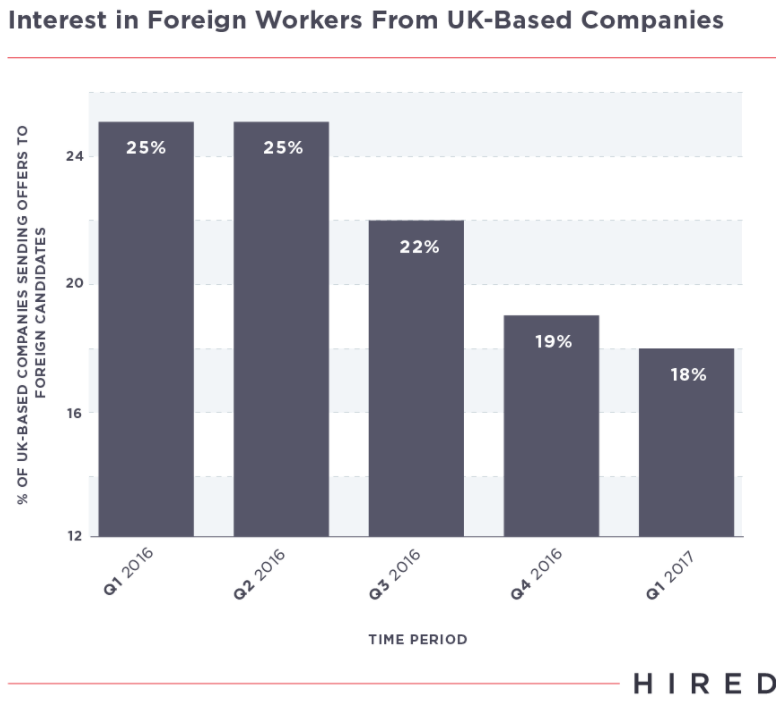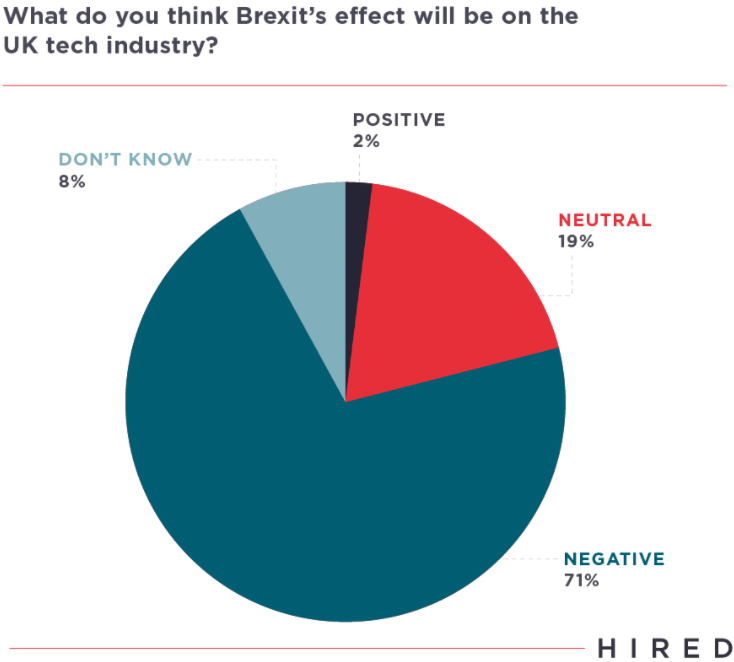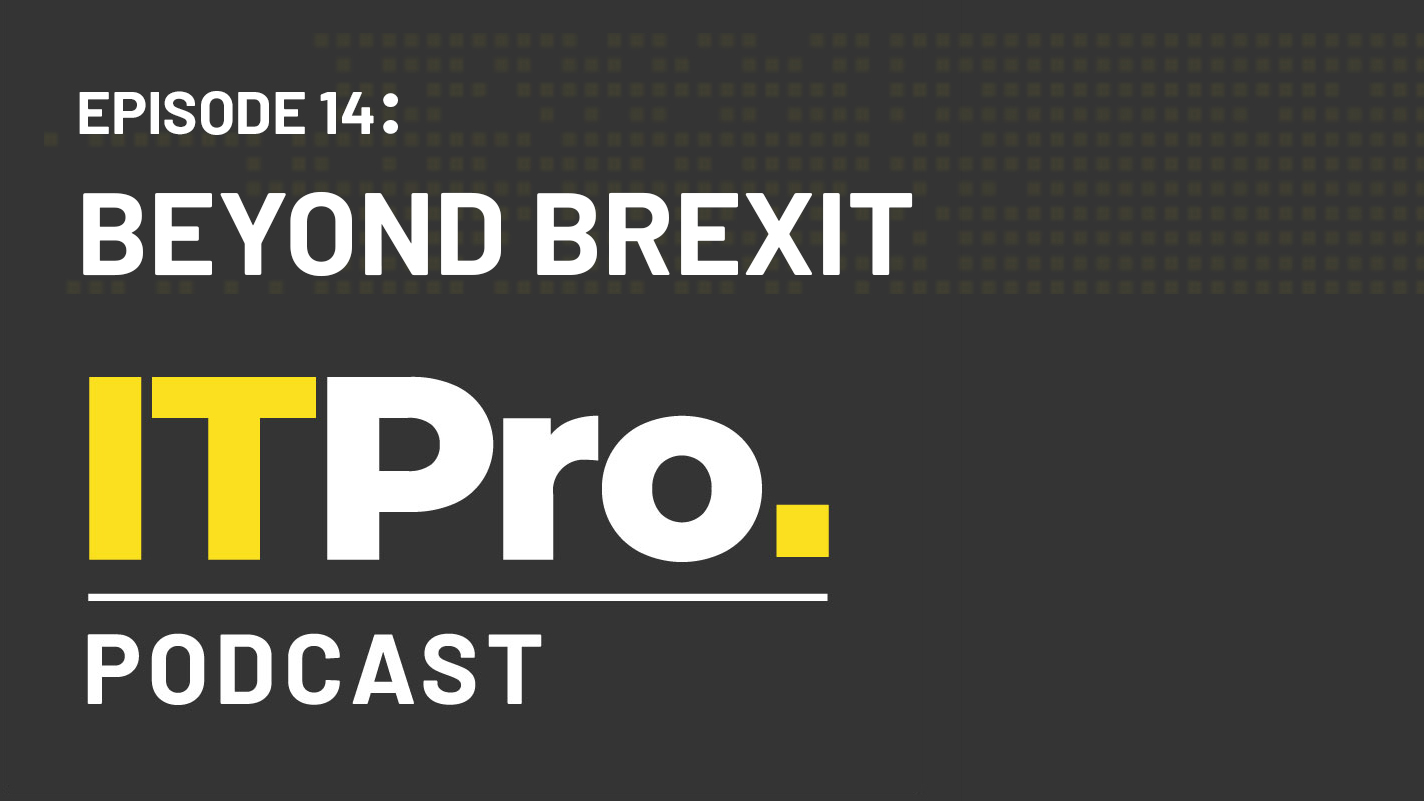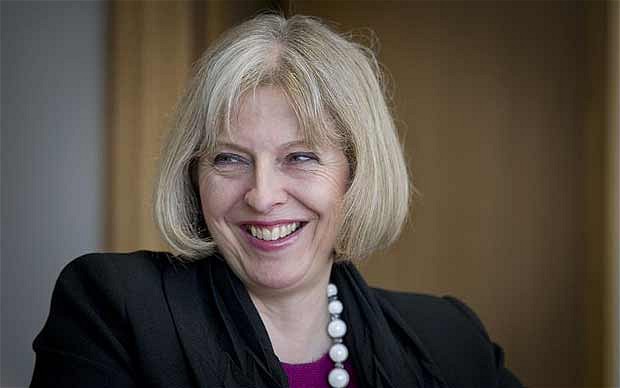Brexit uncertainty causes drop in foreign tech workers
New report by Hired shows EU tech workers are worried about their jobs


Brexit uncertainty has reduced the amount of foreign tech workers looking for jobs in the UK, with companies based here looking less to hire them, too.
Job search marketplace Hired has released a report today which details its findings about the attitudes of foreign workers towards the UK coming out of the EU. The company took the data from its marketplace, where it has over 20,000 candidates and 850 clients in the UK. It monitored how active foreign candidates were on the platform and how clients interacted with them. It also conducted a survey of over 200 UK based candidates.
Hired found that the number of foreign candidates in the pool was less than half than what it was pre-Brexit. UK employers are also less confident in recruiting from abroad since the Brexit vote.
UK companies sending offers to candidates fell from 25% at the beginning of 2016 to just 18% a year later. The representation of foreign candidates in their total talent pool also decreased by 60% since Brexit.

Hired surveyed its UK based candidates and found that 71% said that the UK's exit from the EU tech sector would damage the tech industry. UK workers listed Brexit as their biggest concern, followed by happiness at work, personal development and salary.
77% of the workers said there would still be uncertainty a year from now and 31% anticipate it being harder to find a job in the next 12 months. 70% of the people Hired surveyed have considered leaving Britain in the wake of Brexit and they plan to move to other European cities, although North America, and Australia were also popular relocation destinations.
In addition to this, 41% of all tech workers told Hired they are less likely to start their own business in the UK as a result of Brexit.
Get the ITPro daily newsletter
Sign up today and you will receive a free copy of our Future Focus 2025 report - the leading guidance on AI, cybersecurity and other IT challenges as per 700+ senior executives
Mehul Patel, CEO of Hired, said the company expected foreign workers to be less active on the platform as they don't know their immigration status here so they won't take a new job or move.
"What was also interesting is that we saw a 30% drop in companies asking foreign candidates to interview. Both sides, both candidates and companies, are sort of standing still right now, while there is uncertainty over what Brexit will mean" he said.
Patel highlighted that companies could look at workers from outside the EU through the tier 2 skilled worker programme and look at more home grown talent. He suggested to broaden the base of schools companies look at when hiring and look for people with the right skills but without a computer science degree, as you can test them to make sure they are capable.
He said that it was staggering so many of those asked said they are less likely to start a company here. "If those development jobs are now in Europe you can imagine that UK workers are going to try and get language skills to take advantage of jobs in Europe. The concern here is whether there will be a brain drain," he said.

Patel underlined that once the new rules are in place people will feel more confident in immigrating here and the pessimism will go away. He added: "I think innovation is driven by talent and you have to be a talent magnet. PM May has talked about the UK being a global talent magnet, mayor Khan is talking about London being a talent magnet and so I think people want that to happen, the next question is just when it happens."
Patel also pointed to the stormclouds on the horizon and underlined that there is a sense of urgency in getting the new immigration rules in place.
"The tech economy in London is doing amazingly well, but if the problems around getting the best talent to the UK isn't solved then long term it could impact how quickly this market grows," he said.
Zach Marzouk is a former ITPro, CloudPro, and ChannelPro staff writer, covering topics like security, privacy, worker rights, and startups, primarily in the Asia Pacific and the US regions. Zach joined ITPro in 2017 where he was introduced to the world of B2B technology as a junior staff writer, before he returned to Argentina in 2018, working in communications and as a copywriter. In 2021, he made his way back to ITPro as a staff writer during the pandemic, before joining the world of freelance in 2022.
-
 Cleo attack victim list grows as Hertz confirms customer data stolen
Cleo attack victim list grows as Hertz confirms customer data stolenNews Hertz has confirmed it suffered a data breach as a result of the Cleo zero-day vulnerability in late 2024, with the car rental giant warning that customer data was stolen.
By Ross Kelly
-
 Lateral moves in tech: Why leaders should support employee mobility
Lateral moves in tech: Why leaders should support employee mobilityIn-depth Encouraging staff to switch roles can have long-term benefits for skills in the tech sector
By Keri Allan
-
 Non voyage: Coronavirus, Brexit and the future of business travel
Non voyage: Coronavirus, Brexit and the future of business travelIn-depth The current pandemic and the UK’s impending departure from the EU could have grave consequences for corporate travel
By Carly Page
-
 The IT Pro Podcast: Beyond Brexit
The IT Pro Podcast: Beyond BrexitIT Pro Podcast The UK has officially left the EU, so what happens now?
By IT Pro
-
 Brexit 'could damage' UK tech firm valuations
Brexit 'could damage' UK tech firm valuationsNews However, report finds M&A will be buoyant over the next 12 months
By Clare Hopping
-
 Brexit vote ‘has disrupted UK IT spending’
Brexit vote ‘has disrupted UK IT spending’News Uncertainty caused by referendum has made firms hesitant to make IT investments
By Jane McCallion
-
 Snapchat is set to open a London office
Snapchat is set to open a London officeNews Parent company Snap eschews Ireland tax rates enjoyed by Facebook and Google
By Dale Walker
-
 Theresa May pledges £2bn a year in science and tech R&D
Theresa May pledges £2bn a year in science and tech R&DNews Industrial Strategy Challenge Fund to back advancements in AI and biotech
By Rene Millman
-
 Fujitsu execs outline Brexit concerns
Fujitsu execs outline Brexit concernsNews Fujitsu executives say they are looking for specific outcomes in a potential Brexit deal
By Thomas McMullan
-
 Silicon Valley wants California to leave the USA after Trump win
Silicon Valley wants California to leave the USA after Trump winNews Super Califrexit thinks The Donald is atrocious
By Adam Shepherd